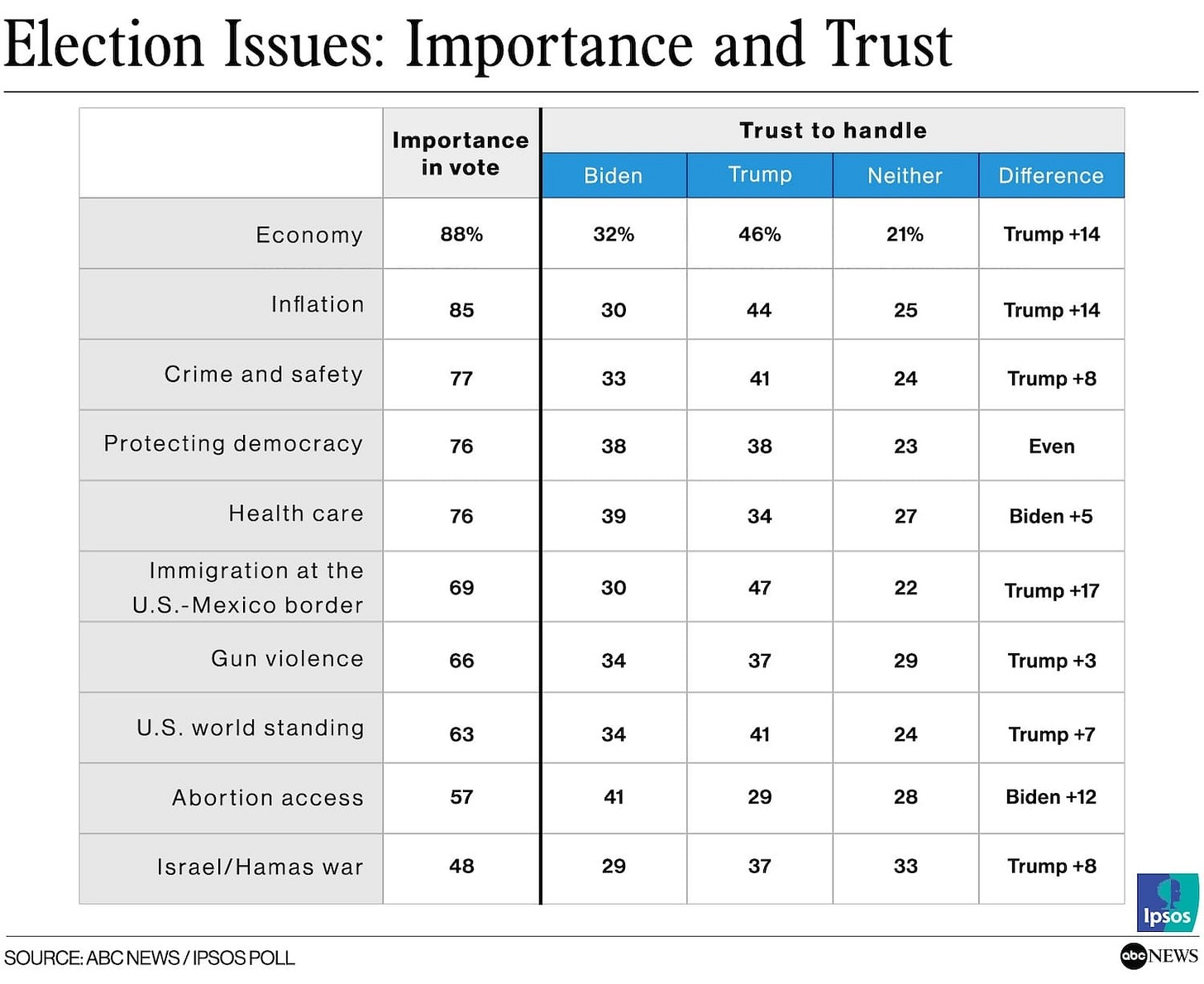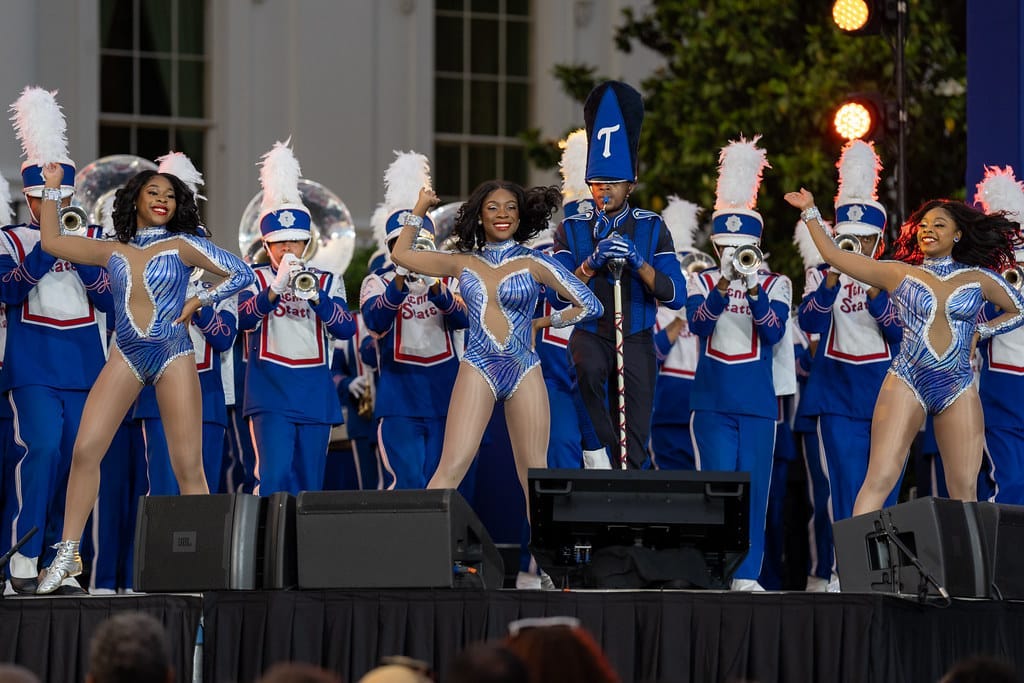My attempt to solve a nagging Trump paradox
Voters view Trump as tough, but ineffective. Maybe that’s why they trust him to handle key issues — even as they disapprove of his proposals.
Good morning! It’s Monday, June 10, 2024. Election Day is 148 days away. If this newsletter was forwarded to you, subscribe here. If you want to contribute to support my work, donate here.
A consistent story of this cycle is that, according to polls, more voters trust Donald Trump than Joe Biden to handle most of the key issues in the election.
This ABC/Ipsos poll from last month, which aligns with other surveys, is a perfect example: Biden leads in two main areas (health care and abortion), ties Trump in a third (protecting democracy), and trails in all the rest, from a 13-point deficit on the economy to a 17-point deficit on immigration.
From those findings, you might think it would follow that when you ask Americans about Trump’s policy proposals, they would express support for them.
But that’s often not the case. This YouGov poll from January, for example, asked about a fairly comprehensive list of 30 Trump proposals and found that all but four of them are underwater with the voters. (The four proposals all concern either immigration or gender, which echoes other polls that find the Republican stances on those issues are much more aligned with the public than the Democratic stances. A Pew poll from last weekend found that 65% of voters believe gender is determined at birth, while a new CBS News poll found sweeping support for clamping down on border security.)
Outside of those areas, though, Trump’s proposals mostly face lopsided opposition. He is the candidate that more voters support to handle crime and safety, and yet many of his main crime-and-safety proposals — allowing the death penalty for drug dealers, requiring police to use stop-and-frisk, arming public school teachers, and sending troops into U.S. cities — are deeply unpopular with voters.
The same is true of areas like the economy and America’s standing in the world, where voters trust Trump more than Biden but turn their nose at Trump’s ideas, like cutting corporate taxes and withdrawing from the Paris climate accords or the World Health Organization.
There are a few potential ways to square this circle. Perhaps voters dislike these ideas in the abstract, but don’t know that Trump has proposed them, so they still trust him to handle those issue areas. I’m sure this is true to some degree — but CNN polled this back in February, and it turns out that voters fully expect Trump to push for several of these policies.
Another possible answer is that Joe Biden is so unpopular, and his image as a competent administrator has been so diminished over the past few years — as prices have risen, one war ended chaotically, two new wars have started, and the flow of migrants has surged — that voters would prefer anyone (even Trump, whose ideas they broadly dislike) to be handling issues like the economy and foreign policy. Again, I suspect this is partly correct, but it only gets us so far as an explanation: when the ABC/Ipsos poll asked voters who they trusted more to handle various issues, “neither” was an option, so someone who was disillusioned by Biden’s presidency and turned off by Trump’s agenda could easily have picked Option C instead of saying Trump.
Then, there’s a third potential answer, the one I want to zero in on this morning: Maybe voters are fully aware of Trump’s more extreme proposals, but doubt he’ll be able to achieve them. In other words, perhaps they think Trump would be directionally better on issues like the economy and immigration, and even though they oppose some of his ideas, they are willing to put that aside because they want someone who will shake up the Biden-era status quo and they are skeptical Trump will be able to implement the fringier ideas anyways.
Voters would be forgiven for believing this. In Trump’s first term, he was thwarted either by Congress, the courts, or his own advisers from executing many of his less popular proposals, like repealing Obamacare, ending DACA, or pulling out of NATO. The first few years of his presidency, as voters well remember, was marked by chaos and infighting, which made for dramatic headlines but rarely led to actual policy changes.
At this point, it’s unoriginal to say that when voters think of the Trump presidency, their minds often seem to be stuck in 2019. That’s usually noted in reference to the economy, where voters seem to remember Trump positively for the economy of 2017-2019, without punishing him for the Covid-induced crash of 2020.
I think the same holds true of Trump’s governing style, with voters appearing to more easily remember the period when he was frequently hemmed in (from 2017 to 2019) rather than his more unshackled era in 2020. To wit: 2020 is when Trump went the farthest in intervening in the Justice Department, meddling in the Michael Flynn and Roger Stone prosecutions. It’s when he became most explicit about melding political and official activities, hosting the Republican National Convention at the White House. It’s when he fired five internal watchdogsat various government agencies and basically gave up on confirming Cabinet secretaries, allowing several top officials to serve illegally on an interim basis. And it’s when he signed his “Schedule F” executive order to allow for civil service workers to be fired.
By 2020, Trump had pushed away many of the “adults in the room” who had tempered him early in his presidency, leaving him with advisers who stoked his most extreme instincts — and setting him on a path that ultimately led to his efforts to overturn the 2020 election and then the January 6th riot.
Many of his 2020 actions were overshadowed by Covid, the protests after George Floyd’s death, and the election, but they quietly revealed a president who had grown more comfortable using the powers of his office to achieve his core objectives. If returned to the White House for a second term, voters would be mistaken to assume that Trump will pick up where he started in 2017, rather than where he left off in 2020.
In no small part, this is because he is poised to be surrounded by the very same advisers he began to elevate during the personnel purges of 2020 — and because those ex-officials have been busily preparing, ensuring Trump will be much more able to hit the ground running in 2025 than he was after his shambolic first transition. (Remember Chris Christie’s months of preparatory work that was thrown into the trash can?) There will be no learning curve this time, no scrounging around for hard-edged underlings. As with 2020, when some of his most aggressive moves came in response to his impeachment probe (like firing key witnesses), Trump will again be consumed with a desire for retribution: some of his advisers are now pushing for Trump to bring charges against Alvin Bragg, the prosecutor who notched his felony conviction, if he’s re-elected.
If you’re wondering whether Trump would be prevented from making a move like that — as he might have been during his first administration — you need only listen to the advisers who are poised to play a prominent role in his potential second term.
This time around, his chief of staff will not be someone like Reince Priebus, an establishment party man, or John Kelly, a military institutionalist, either of whom might have discouraged such a move, but someone closer to Russell Vought, a lead contender for the role who was profiled by the Washington Post this weekend.
Vought, as the Post reported, has written that the U.S. has entered a “post-constitutional era,” in which Democrats have weaponized government against conservatives. In response, he has called for a “radical constitutionalist” agenda, in which the president asserts more control over the executive branch, including civil servants and agencies like the Justice Department that are typically given independence.
As it happens, presidential intervention in independent agencies and the civil service are the two very least popular of all the Trump proposals YouGov polled back in January, fetching 18% and 21% support, respectively.
Which means they bring us back to our original question, and offer just another reminder of why Trump is such a difficult candidate to run against. According to a CBS News poll released this weekend, a huge number of Americans — 66% — view Trump as “tough,” but only 52% call him “effective” and 49% regard him as “competent.”
And, so, we arrive at our answer. A critical swath of voters view Trump simultaneously as a strong leader and an ineffective executive, allowing him to reap all the electoral benefits of toughness — without being saddled by the baggage that usually comes with proposing unpopular ideas.
Suddenly, it’s not so strange that voters might trust Trump more on issues like crime or the economy (since they’re reassured by his tough rhetoric), without worrying he’ll go so far as to carry out ideas they find discomfiting (because they don’t believe he’ll manage to achieve them).
This view of Trump’s effectiveness, however, should probably be updated to account for how his governing style grew more aggressive in 2020, and likely would again in 2025. With a harder-edged cast of personnel at his side — and years of preparation and on-the-job training under their belt, combined with a fresher, more dramatic set of personal grievances — voters might be in for a surprise if they’re counting on a second Trump term to be more bark than bite.
More news to know.
A centrist coalition is expected to maintain its majority in the European Parliament after elections over the weekend — but far-right parties are set to win a record number of seats, fueled by surges in France and Germany. After his party was battered by right-wing rival Marine Le Pen’s faction in the polls, French president Emmanuel Macron dissolved the country’s parliament and scheduled snap elections.
For those keeping track at home: France will vote on June 30 and July 7, in elections scheduled yesterday. The UK is set to vote on July 4, in elections scheduled last month. If you’re jealous about their short campaign seasons, well, same here.
In other global news: Indian prime minister Narendra Modi was sworn in for a third termafter his party struggled in the country’s recent elections but maintained power... Centrist minister Benny Gantz withdrew from the Israeli war cabinet. Gantz’s move will not impact prime minister Benjamin Netanyahu’s grip on power, but it leaves him more reliant on right-wing members of his coalition.
After an executive order last week tightening the border, President Biden may zig to the other side of the issue with a new action shielding undocumented spouses of U.S. citizens from deportation.
The U.S. and Saudi Arabia are close to finalizing a defense treaty, per the Wall Street Journal. The Biden administration hopes that the pact will lay the groundwork for a Saudi-Israeli normalization deal.
Donald Trump proposed ending taxes on tips at a Las Vegas rally yesterday. Later in the night, he endorsed Sam Brown, the GOP establishment’s favored Nevada Senate candidate.
North Dakota Gov. Doug Burgum is reportedly rising in the Trump veepstakes.
The day ahead.
At the White House: President Biden will host his second annual Juneteenth concert on the White House grounds. Vice President Harris will also attend.
On the Hill: The House and Senate are out until tomorrow.
In the courts: Donald Trump is scheduled to sit for a virtual interview with a New York City probation officer, a required step ahead of his sentencing next month... Hunter Biden’s defense team is expected to wrap up their arguments in his Delaware trial, allowing the jury to begin deliberations.
At Turtle Bay: The UN Security Council is expected to vote on a U.S. resolution calling on Hamas to accept the Israeli ceasefire proposal.
Thanks for reading.
I get up each morning to write Wake Up To Politics because I’m committed to offering an independent and reliable news source that helps you navigate our political system and understand what’s going on in government.
The newsletter is completely free and ad-free — but if you appreciate the work that goes into it, here’s how you can help:
Donate to support my work or set up a recurring donation (akin to a regular subscription to another news outlet).
Buy some WUTP merchandise to show off your support (and score a cool mug or hoodie in the process!)
Tell your family, friends, and colleagues to sign up at wakeuptopolitics.com. Every forward helps!
If you have any questions or feedback, feel free to email me: my inbox is always open.
Thanks so much for waking up to politics! Have a great day.
— Gabe









While this does make sense on some level, many still see him as somewhat more effective than Biden anyway.
So I guess the idea is that he is marginally more effective and competent than Biden, but not enough so to actually do the fringier things on his list?